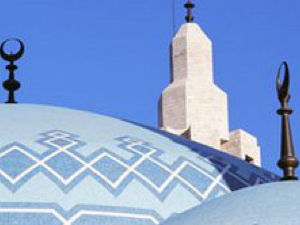
Edit OmarKN
-

“They err in their understanding of the reality of intermediaries, and recklessly rush to the judgement that any intermediary is shirk ...”
From: Notions That Must Be Corrected
Shaykh Muhammad b. `Alawi al-Maliki al-Hasani, p.53ff
Allah said:
{ Do not curse those upon whom they call beside Allah, lest they wrongfully curse and revile Allah through ignorance. Thus to every nation have we made their deeds seem fair. Then to their Lord is their return, when He will inform them of that which they used to do. }
al-An’am: 108
It is narrated from ’Abd al-Razzaq, ’Abd b. Hamid, ibn Jarir, Ibn al-Mundhir, Ibn Abi Hatim, and Abu al-Shaykh, from Qatada ( رضي الله عنه ), who said: "The Muslims used to curse and revile the idols of the disbelievers, and so the disbelievers reviled and cursed Allah, the Mighty, the Magnificent. So Allah revealed:
{ Do not curse those upon whom they call beside Allah, lest they wrongfully curse and revile Allah through ignorance. }
This is the reason for the revelation of this verse, which strongly forbids the believers from insulting the idols that the pagans used to worship in Mecca, because such insults would enrage those who believed in their hearts that those statues and idols were gods, with the ability to grant benefit and harm. This rage would drive them to meet the believers with similar insults against the One whom they worshipped, the Lord of the worlds, and so they would ascribe to Him defects, though He is far removed from all defects.
Again, if they were truly sincere in their claim that their idol worship was only a means of drawing nearer to Allah, they would not have dared insult Him to avenge their idols when they were insulted. It is explicitly clear from this that the pagans held Allah in far less esteem than they held their own idols. Similar can be said with regards to Allah’s words:
{ And if you were to ask them who created the heavens and the earth, they would surely say "Allah!" }
al-’Ankabut: 61
If the pagans truly believed that Allah, the Exalted, is the only Creator, and that their idols had not created anything, they would have worshipped Allah instead of their idols, or at the very least, their reverence toward Allah would have been greater than their reverence toward their stones and statues. Is this consistent with their insults toward Allah, the Mighty, the Magnificent, out of jealousy for their own idols against Him? It is abundantly clear that it is not consistent in the least.
Furthermore, the verse that we are considering is not the only proof that Allah was lower in the esteem of the pagans; rather, there are many similar examples. Among them is the statement of Allah the Exalted:
صلّى الله على سيّدنا محمّد و على آله و صحبه و سلّم
The blessings and peace of Allah on the Prophet, his Family, and his Companions, ( sallAllahu `aleihi wa sallam ) .


Related texts
![]() The Intermediary of Shirk
The Intermediary of Shirk
Notions That Must Be Corrected; Shaykh Muhammad b. `Alawi al-Maliki al-Hasani
[download book]